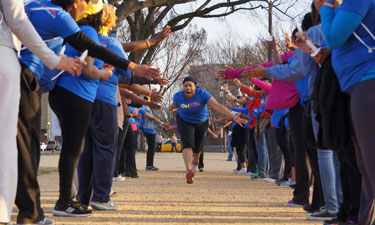 “When black women walk, things change,” says Vanessa Garrison, co-founder and chief of operations at GirlTrek. Garrison isn’t just talking about physical health, although positive change in that department is certainly an outcome of involvement with GirlTrek. Rather, she’s referring to a host of social impacts that result from the mobilization and action of African-American women. GirlTrek aims to provide a platform for one of the world’s most-marginalized populations to get healthy, gain confidence and transform neighborhoods.
“When black women walk, things change,” says Vanessa Garrison, co-founder and chief of operations at GirlTrek. Garrison isn’t just talking about physical health, although positive change in that department is certainly an outcome of involvement with GirlTrek. Rather, she’s referring to a host of social impacts that result from the mobilization and action of African-American women. GirlTrek aims to provide a platform for one of the world’s most-marginalized populations to get healthy, gain confidence and transform neighborhoods.
Inspiration and Action
Six years ago, Garrison and her friend and GirlTrek co-founder, T. Morgan Dixon, were struck with an idea — a 10-week challenge inviting black women to head outside and start walking. “We emailed 200 friends, family members, colleagues — basically all of the black women we know — and asked them to forward the message,” Garrison recalls. “We received about 600 responses from all across the country. At the end of 10 weeks, we weren’t prepared for what happened. The success stories flooded in and people didn’t want it to end. We heard, ‘This is changing my life. When are we going to do it again?’”
Struck by the overwhelming response and personally moved by the impact of the 10-week challenge, Garrison and Dixon formed GirlTrek, a revolutionary approach to fitness and community. “The reality is, black women and girls are living under some trying circumstances in today’s world,” Garrison says. “They live in communities that are under extreme stress, whether it be from crime, health disparities, blight or even gentrification. We believe that when these women become active, they become powerful agents for change, and GirlTrek is here to support them.”
Walking and Civil Rights
GirlTrek challenges its members to walk once a day, every day, in solidarity and in health. As Garrison puts it, “Walking is often underestimated. It may be the single best way to improve your overall health. Walking works: It is affordable, accessible and culturally relevant.” That last descriptor may give some pause, but Garrison sees GirlTrek as deeply rooted in the Civil Rights movements of yesteryear and today. She points to the influence of Fanny Lou Hamer, the lauded voting rights activist, as having a significant impact on the formation and mission of GirlTrek. “Before [Fanny Lou Hamer] was the iconic Civil Rights activist, she was one of us,” Garrison says. “Her formal education was limited. The most powerful thing about Fannie Lou Hamer wasn’t her heart-wrenching story of being jailed and beaten. Fannie Lou Hamer’s power was her voice. It was authentic. Everyday. Relatable.”
Garrison asked herself, what would happen if she rallied all the “everyday” women around her to get up and get moving? “What if we found and mobilized all of the Fannies, the Harriets, the Ida B’s and Ella Bakers in our communities today?” Garrison continues. “What if we asked them to start a new kind of health movement with us? To walk for healing. What if every woman who — in Mrs. Hamer’s words — was ‘sick and tired of being sick and tired,’ rallied? Grassroots leadership is how change has always happened in our community.”
One Million Walking
Already, more than 60,000 African-American women and 250,000 supporters have pledged to walk as part of GirlTrek. By 2018, however, Garrison hopes to entice 1 million mothers, daughters, sisters, aunts and grandmas to head to their local park or walking trail every day “as a declaration of self-care — a practical step toward healthier lives and a historic strategy of collective action,” she says.
That parks are ubiquitous across the United States and, in most cases, free and open to the public, make them an ideal setting to achieve GirlTrek’s 1 million walkers goal. “Parks are a way to get out in nature and use the free resources around you,” Garrison says, citing GirlTrek neighborhood captains in Florida’s Broward County and Houston, Texas, who lead multiple walks per week in their local parks.
“Eighty-two percent of black women are over a healthy weight,” she continues. “Half of us are obese. One-hundred-forty-eight black women die every day from heart disease. That is more than smoking, gun violence and HIV/AIDS combined. Simply put, black women are dying younger, faster and at higher rates from preventable obesity-related diseases than any other group of women in the country and nobody is talking about it!
“We know that two-thirds of black women [regularly engage] in little or no leisure time physical activity — because we have no leisure time. From the time our feet hit the floor in the morning to the time we close our eyes at night, our steps are ordered, by our jobs, sometimes two or three jobs, or our efforts to find a job… For [the women involved with GirlTrek], walking has become a keystone habit that leads to a cascade of tiny rebellions against disease.”
Samantha Bartram is the Executive Editor of Parks & Recreation magazine.

